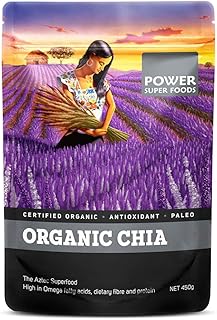Chia seeds are known as nutrient powerhouses, originating from Central America and cultivated by ancient Mexicans dating back to 2,600 B.C. These tiny seeds were once a staple food for Indigenous peoples in the Southwestern US and Mexico, with historical significance as one of the four vital crops alongside corn, beans, and amaranth during Mayan times. Even Aztec priests and nobility accepted chia seeds as tribute and taxes, showcasing their high value. While modern times may not place the same importance on chia seeds, their exceptional nutritional properties and health benefits deserve recognition.
One of the key reasons to incorporate more chia seeds into your diet is their richness in essential omega-3 fatty acids, crucial for optimal brain function and aiding in the absorption of vital vitamins like A, D, E, and K. Surpassing flaxseeds, chia seeds offer 5 grams of omega-3 fatty acids per ounce, making them a top vegetable source of this essential nutrient.
Additionally, chia seeds provide about 25% of your daily fiber requirement in just one serving. With 11 grams of fiber per ounce, adding a couple of tablespoons of chia seeds to your morning routine can significantly boost your fiber intake, benefiting digestive health and overall well-being.
Due to their high soluble fiber content, chia seeds create a gel-like consistency when mixed with water, promoting a feeling of fullness and satiety. This gel-forming property also slows down the digestive process, aiding in better carbohydrate breakdown and sustained energy levels.
Moreover, chia seeds are a great source of protein, with approximately 23% of their calories derived from this essential macronutrient. Consuming just two ounces of chia seeds can provide 8 grams of protein, supporting muscle repair and growth.
Not only are chia seeds nutritionally beneficial, but they are also pantry-friendly, boasting a long shelf life without compromising flavor or nutrients. Their natural antioxidants allow for extended storage without the need for special conditions, unlike other omega-3 sources like fish oil or algae.
Furthermore, chia seeds contribute to eco-friendly farming practices by naturally repelling insects due to their high omega-3 fatty acid content. This quality eliminates the need for pesticides during cultivation, promoting sustainable and environmentally conscious agriculture.
Incorporating chia seeds into your diet can be a flavorful experience with recipes like Blueberry-Chia Blaster, Raw Chocolate-Chia Energy Bars, and Overnight Chai Steel-Cut Oats. These recipes offer creative ways to enjoy the nutritional benefits of chia seeds in delicious and satisfying ways.
Expert commentary from Talia Fuhrman, a Cornell University graduate in Nutritional Sciences, emphasizes the importance of chia seeds as a valuable addition to a vegetarian diet. Talia highlights the diverse benefits of chia seeds, from their nutrient density to their culinary versatility, making them a must-have ingredient for vegetarians seeking optimal health.
📰 Related Articles
- Unlocking the Nutritional Power of Chia Seeds: Best Practices
- Unlocking the Power of Chia Seeds for Optimal Health
- Unlocking the Power of Chia Seeds for Athletes
- Unlocking the Health Benefits of Chia Seeds: A Nutrient Powerhouse
- Unlocking the Health Benefits of Chia Seeds in Your Diet






